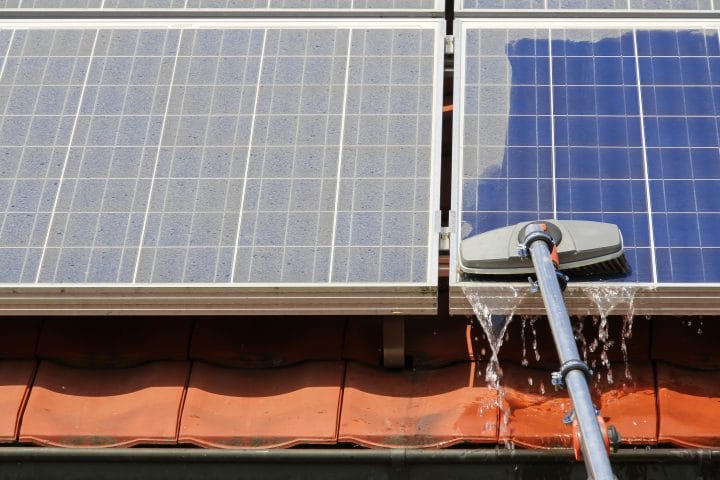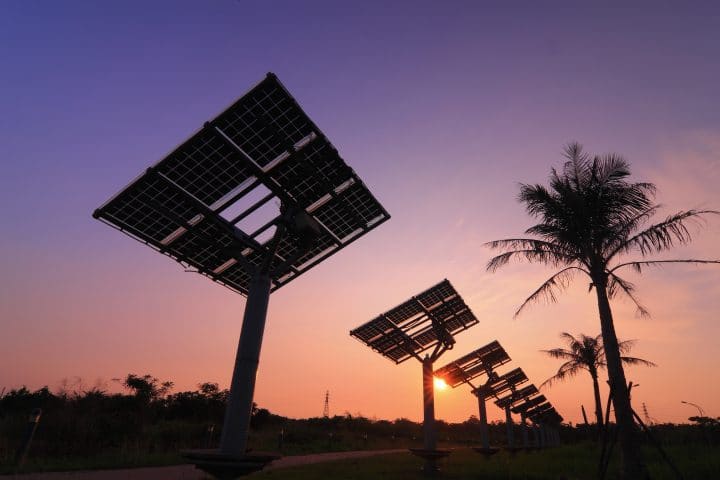This article looks at the different pros and cons of solar energy. By reading this article, you will discover what makes the sun one of the most popular renewable energy sources in use today. You will also gain an insight into the various drawbacks that going solar can have.
Solar Energy Pros
There are many benefits associated with the use of solar energy technologies. Let’s now take a look at the numerous advantages that going solar can have.
1. The Sun is a Renewable Energy Source
The sun will support life on earth for as long as it shines. We can, therefore, consider it a renewable and sustainable energy source. We are able to rely on solar energy, unlike non-renewable sources of energy such as coal, oil, and gas.
2. Solar Power is Environmentally Friendly
We can use solar energy as an environmentally friendly alternative to fossil fuels. Unlike fossil fuels, solar panels do not produce carbon dioxide or methane. These are greenhouse gases that pollute the earth and contribute to global warming.
Whilst the manufacturing of solar cells does cause pollution, this will be offset once they are up and running. By using more solar energy to meet global energy demands, we can help to improve the environment.
3. The Sun is Widely Available
The sun shines everywhere on earth. This makes it an abundant source of energy. As a result of this, solar panels are a viable option for generating electricity around the world. You can find solar energy in use everywhere from Alaska to Australia. Even the Amundsen-Scott Research Station at the South Pole has gone solar.
4. Solar Energy is Versatile
You can use solar energy in different ways. Most of you will know that you are able to use it in order to generate electricity, but did you know you can also use it to heat water? Because of this, solar energy is more versatile when compared with most other clean energy sources.
5. Going Solar Reduces Fossil Fuel Consumption
Fossil fuels such as coal, oil, and natural gas will one day run out. As we use more solar energy, we reduce the need to burn fossil fuels. This not only has environmental benefits, but it also helps to conserve resources for future generations to come.
6. Solar Panels Are Quiet
Solar panels are a low noise power technology. You might hear a slight hum if you stand next to one, but that’s about it. This makes solar a key contender for use in a domestic setting.
Other renewable energy technologies can be noisy. For example, wind turbines can create significant levels of noise pollution. This can lead to disputes, legal action, and protests against the development of wind farms and some smaller installations.
7. The Sun is Free to Use
We can use the sun’s energy resources completely free of charge. After the initial cost of solar panels, there is no charge for the solar energy your system consumes.
With fossil fuels, there is a charge for the raw materials at some point in the energy production cycle. As a result of this, domestic solar panels can reduce or sometimes even eliminate your monthly electric bills.
8. You Can Install Solar Panels On Your Roof
Solar panels require a large footprint to be able to generate enough electricity to power a building. Whilst this can be a disadvantage of solar energy, we can install solar panels onto rooftops to mitigate the issue.
9. Solar Panels Are Low Maintenance
The lack of moving parts in a solar cell reduces maintenance significantly. Because of this, they can often be left running for years without experiencing any problems.
You should clean your solar panels at regular intervals to ensure peak efficiency. Apart from this, they are generally low in maintenance. This factor helps to provide a return on investment over the lifetime of the system.

10. Solar Has Low Running Costs
Solar energy is completely free to use. As a result, solar panels have low running costs. After installation, the only cost you are likely to encounter is for any maintenance you might need.
11. Solar Energy Can Provide Power in Remote Locations
Solar energy has the potential to generate electricity in remote locations. It can be very expensive or even unfeasible to run power cables over long distances. In such cases, solar panels can be a wise investment.
We can also use solar energy as a portable power solution. For example, devices exist that can charge a smartphone directly from the sun. Portable solar lights are another example of this. You can use them in your garden or take them on camping trips.
Even the aviation industry is tapping into the benefits of solar energy. This can be seen in the Solar Impulse project that flew a solar-powered plane 40,000km around the world. The project is helping to pave the way for a new generation of portable solar technologies.
12. Going Solar Can Provide a Return on Investment
A well-designed solar energy system should provide a return on investment (ROI) over its lifetime. Government tax credits and state grants are sometimes available to help speed up ROI and help turn a profit.
Some countries offer a ‘feed-in tariff’. This process allows any excess electricity a solar panel might produce to be sold back to the grid. This can help to accelerate ROI and bring in a steady income.
13. Solar Can Increase Energy Security
We can use solar energy to reduce our dependence on foreign energy supplies. As a result of this, we can increase our ‘energy security’. This is a term we use to describe the association between national security and the availability of natural resources for energy consumption.
War, sanctions and other political issues can all have an effect on a country’s energy supply. Therefore, when we produce our own energy, we are less vulnerable to these external influences.
14. Solar Panels Are Efficient
Technological advancements in the solar power industry are helping to drive the efficiency of solar panels. Modern solar cells are far more efficient than those made only five or ten years ago. Whatsmore, they are on track to see a further increase in efficiency over the coming years.
15. The Solar Energy Industry Creates Jobs
The emergence of solar power and hot water technologies has led to a big increase in demand for such systems. As a result, this has helped to create a global industry of manufacturers, suppliers, and installers. This industry has created jobs for millions of people right across the globe.
In 2018, the solar photovoltaic (PV) industry employed over 3.6 million people worldwide. This is a massive amount of jobs and shows how important the industry is to the global economy. Data for this statement was taken from IRENA’s annual review of renewable energy and jobs. We used the 2019 annual review which you can find here.
Solar Energy Cons
Whilst going solar may seem like the right decision, there are many drawbacks to doing so. Let’s now take a look at the main disadvantages of solar energy.
1. Solar Panels Are Expensive
The upfront costs of installing home solar panels can run into the tens of thousands of dollars. This upfront capital is hard to find for many homeowners. Some people might even choose to take out loans to fund their project – a process that would add even more cost over time due to the interest paid on the loan.
2. The Sun Doesn’t Shine All Day Long
Solar panels need to absorb solar radiation in order to generate electricity. Whilst this is fine during daylight hours when there is enough sunlight, solar technologies are useless when it’s dark.
Whilst we can use batteries to store electricity for use at night, they tend to be expensive and consume lots of space. Most importantly, they might not provide enough energy storage for the needs of a busy household. This can lead to electricity shortages during the night.
Seasonal changes in daylight hours further influence this drawback. Solar panels will generate less electricity when the nights are long, making them less efficient during the winter months.

3. Solar Panels Are Vulnerable to Atmospheric Conditions
Various atmospheric conditions can have a negative impact on solar panels. Long-lasting periods of heat and humidity can reduce the performance of a solar cell. Delamination of solar panels can sometimes occur in these conditions.
Pollution can also reduce the efficiency of solar panels. Because of this, they can be a less viable option for those living in highly polluted towns and cities. Cloud cover and fog can also reduce the efficiency of a solar cell.
4. Solar Panels Have a Large Footprint
Solar panels often require a large footprint to provide enough electricity to power a building. Compared with other renewable energy technologies, solar panels have the largest footprint for the power they generated.
Because of this issue, some homeowners worry about not have enough space for the installation. You can, however, mitigate the problem by installing solar panels on your roof.
5. Manufacturing Solar Cells Causes Pollution
Although solar cells don’t produce pollution themselves, the manufacturing of them does. Solar cells contain silicon which is extracted from raw materials in a blast furnace. This process releases large quantities of greenhouse gases into the atmosphere.
As a result of this, how solar cells are made can be bad for the environment. On the other hand, once they are up and running, they will help to offset their carbon footprint. This is based on the assumption that they are now generating energy that would have previously been generated from the burning of fossil fuels.
Summary
There are many advantages and disadvantages associated with the use of solar energy technologies.
The main benefits of solar energy are that it’s renewable, sustainable, environmentally friendly, and widely available. We can use it to generate power and heat water in many parts of the world.
The main drawbacks of solar energy is that solar panels are expensive and can only generate power during the day. They are also vulnerable to atmospheric and seasonal conditions that affect efficiency.
It is safe to say that the benefits clearly outweigh the drawbacks. Solar energy can play a vital role in helping to meet future energy demands in a clean and environmentally responsible way. Having said this, going solar might not be the right decision for everyone. Therefore, it is important to weigh up the pros and cons based on your own personal circumstances.